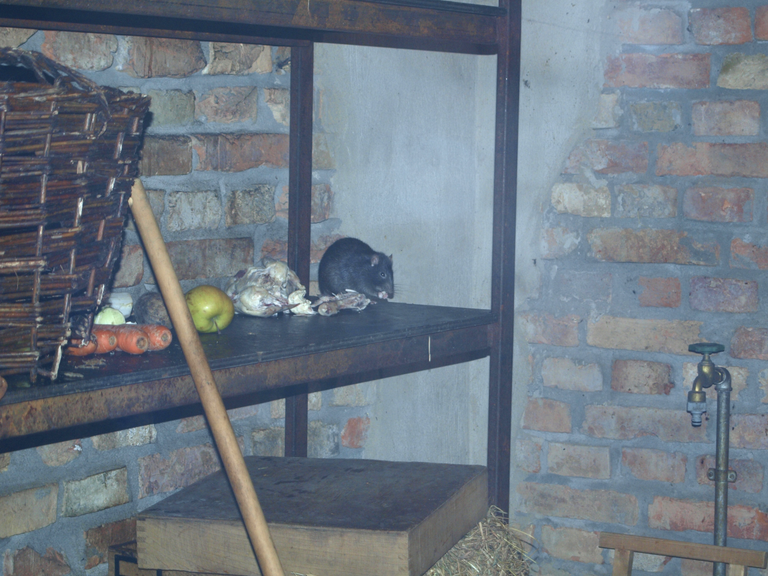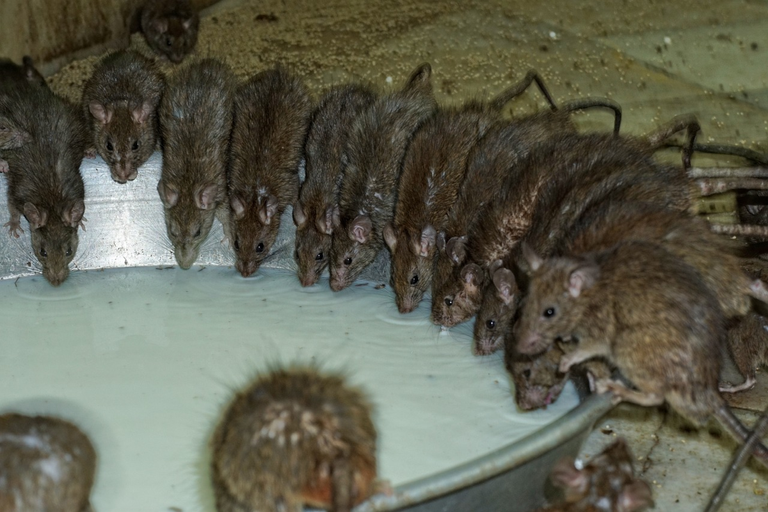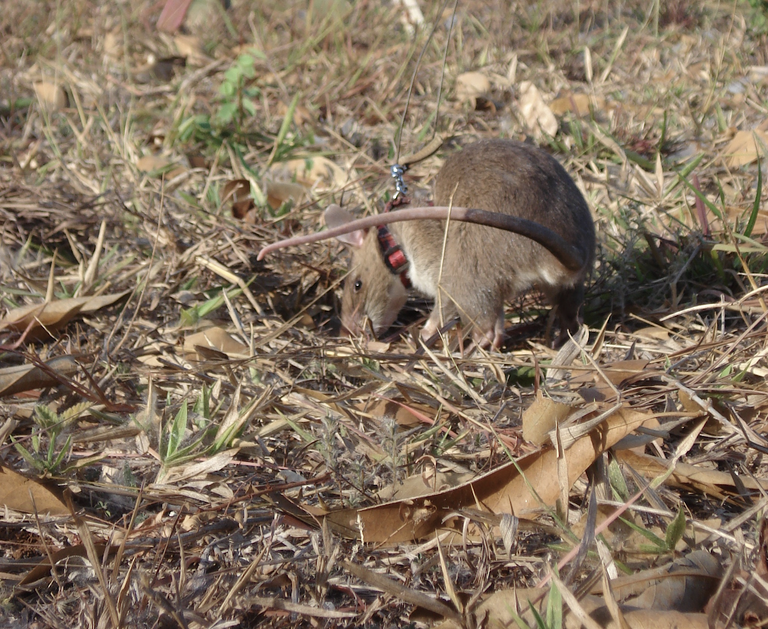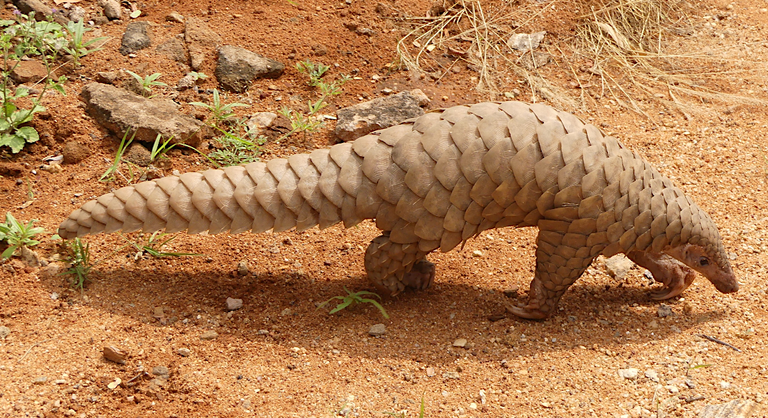Rats: Do They Have a Good Side?
Nobody likes rats, right? I think I was in middle school when I first read about rats being vectors of bubonic plague, a scourge that wiped out large swaths of the world's population. Ever since reading about plague epidemics, the idea of rats and disease has been inextricably linked in my mind.
Black Rat, Rattus Rattus Today, rats are considered to be vermin in many parts of the world. In New York City, for example, there are an estimated three million of these rodents. The city's transit department has even issued a rat map, which shows commuters the 'rattiest' train stations, so people who are 'rat phobic' might avoid sighting the animal. However there may be more to the rat than meets the eye. Does Rattus rattus have redeeming qualities? As a fan of good literature, I know that few credible characters are all good, or all bad. Characters are complex. And so it is with the rat. Rats Drinking at Karni Mata Temple, Rajasthan, India Not only is the rat considered sacred by devotees of the goddess Karni Mata, but in some parts of the world rats are food. According to a 2016 article published in the science journal Embo Reports, rats are actually considered a delicacy in some cultures. For example, rats are a "staple in Cambodia, Laos, Myanmar, parts of the Philippines and Indonesia, Thailand, Ghana, China and Vietnam". The article goes further and describes the desirability of rat meat: "Rats are tinned in the Philippines, sold as STAR meat (rats spelled backwards) in supermarkets, often eaten at weddings in Vietnam, and usually considered a delicacy by most South East Asians”. Rat Meat on Sale in Thailand The authors of the Embo piece suggest that rats might be one solution to world hunger. They go on to explain that anticipated global population growth by 2050 is 9 billion, which would require a 50% increase in food production. Why not exploit rats, these authors ask. Rats would be an accessible, inexpensive source of protein. Instead of exterminating rats as pests, maybe we can harvest them as game. Not only might rats be used for nutrition, but exploiting them in this way would also have an economic benefit. According to one Canadian government agency, "Rats are the most destructive vertebrate in the world". They destroy food supplies, cause damage to structures, and spread disease. Admittedly, it might take a cultural shift for many people to regard a rat as a desirable addition to the diet. However, people have been conditioned to eat frog legs, insects and assorted live species, including: octopus (still squirming), frogs (with a beating heart), shrimp (still moving), ants, larvae, and oyster. Apparently, for many humans, if we can swallow it, we will eat it. Here is a Youtube video showing people swallowing live octopus. In some cases, the octopus gets its revenge as the eater chokes to death. (Watching this video will not be a pleasant experience for many of my readers. It wasn't for me, but in the spirit of research, I pressed on):

Credit: Dellex. Used under CC Attribution-Share Alike 3.0 Unported, 2.5 Generic, 2.0 Generic and 1.0 Generic license. The black rat, also often called the Norwegian rat, has been traditionally implicated in the spread of plague during devastating epidemics. However, recent research suggests there may be other vectors that harbored and spread the bacterium (Yersinia pestis) in later epidemics.

Credit: Volker Glätsch on Pixabay.. This temple is known as the 'Temple of Rats'. It is home for thousands of rats that roam freely. It is believed by many who support the temple that the rats are sacred. They are believed to be reincarnated members of the goddess Karni Mata's family.

Credit: Nicolai Bangsgaard. Used under CC attribution 2.0 generic license.

Moving on to what I consider a more pleasant area of rat exploitation:
A Belgian NGO named APOPO (Anti-Personnel Landmines Detection Product Development) trains rats to sniff out landmines. The rats are so light that when they cross a mine field, their weight does not trigger a detonation. And yet their sense of smell is so acute that they can detect TNT buried underground.
HeroRat Sniffing Out Landmines

Credit: Gooutside. Public domain
The rat trained to do this highly specialized work is the giant African pouched rat. This rat has a long life span, as much as eleven years in some cases. It is also very intelligent. As a matter of fact, in one skills test (distinguishing patterns in two dimensions), rats actually performed better than humans.
The intelligence of the rat is obviously important, as is its relatively long life span. It takes about a year to train one of these pouched rats to do its job. Black rats in captivity can live up to four years. Brown rats can live between 4-6 years in captivity. It is considered a better investment to train the longer-lived pouched rat than the brown or black rats.
Here is a Youtube video that highlights the accomplishments of Magawa, a landmine-detecting pouched rat in Cambodia.

It was estimated that, in 2022, 1.3 million people died from tuberculosis. A larger number experienced long-term consequences after being cured of the disease. Diagnosing TB can be a difficult and costly process. The difficulty is compounded in so-called developing countries. Add infection with HIV to the mix and the bacterium (Mycobacterium tuberculosis) that causes TB becomes extremely elusive.
Rats, however, have proven to be an inexpensive, efficient tool for diagnosing the disease. This is especially true in cases where the patient has HIV. Some studies have shown the rats detect more cases of TB than do traditional laboratory analyses.
Here is a YouTube video explaining how rats are trained to detect tuberculosis:

So far, we discussed rats as being a potential food source, mine-sniffing experts and TB detectives. This complex animal has even more potential utility. They have been trained to detect cadavers after a disaster.
It is not anticipated that the rats used in this capacity will replace dogs. They will be sent into a disaster site after dogs and humans have completed their work. The rat has two advantages: it is not connected to one handler, as a dog would be, and it can fit into small places a dog could not reach.

Rats are trained not only to detect decomposing bodies. Live bodies may also be on their radar. They have been used to find shipments of animals that are being smuggled. One animal the rats are trained to find is the endangered pangolin.

A.J.T. Johnsingh, WWF-India. Used under CC Attribution-Share Alike 4.0 International license.
The site News Africa explains, the rats are "able to sniff out pangolin scales, which smugglers often hide beneath other strong-smelling products, such as coffee or spices, to throw customs officers off the scent." The site further explains that rats are less expensive than dogs to transport and more resistant to tropical diseases.

Conclusion
I'm not sure how many rats I've seen in my lifetime. Not a lot. However, I do admit a fondness for mice (see an earlier blog I wrote about caring for 23 pet mice). I recognize that rats compete with humans for living space and resources. They are an environmental, economic and health challenge. But as with almost every creature on earth (even mosquitoes!) they have their uses.
Thank you for reading my blog. Health and peace to everyone.

Selected Sources Used in Writing This Blog
https://pubmed.ncbi.nlm.nih.gov/11000955/
https://www.cdc.gov/plague/index.html
https://www.gavi.org/vaccineswork/black-death-may-not-have-been-spread-rats-after-all
https://www.newsweek.com/how-find-out-how-many-rats-each-new-york-station-1836029
https://www.dabblewriter.com/articles/complex-characters
https://www.ncbi.nlm.nih.gov/pmc/articles/PMC5341521/
https://www.embopress.org/doi/full/10.15252/embr.201642306
https://www.alberta.ca/rat-control-methods
https://www.treehugger.com/animals-that-are-eaten-alive-by-humans-4869257
https://news.cornell.edu/stories/2023/03/bomb-sniffing-rodents-undergo-weird-vaginal-transformations
https://www.science.org/content/article/forget-dogs-these-rats-could-be-future-search-and-rescue
https://hbr.org/2015/01/rats-can-be-smarter-than-people
https://animaldiversity.org/accounts/Rattus_rattus/
https://www.mammal.org.uk/species-hub/full-species-hub/discover-mammals/species-brown-rat/
https://www.who.int/news-room/fact-sheets/detail/tuberculosis
https://www.thelancet.com/journals/langlo/article/PIIS2214-109X(21)00367-3/fulltext
https://www.tbonline.info/posts/2016/3/31/path-diagnosing-tb-1/
https://asm.org/videos/diagnosing-tuberculosis-in-developing-countries
https://www.tbalert.org/about-tb/global-tb-challenges/tb-hiv/
https://apopo.org/what-we-do/detecting-tuberculosis/faqs/
https://www.medicalnewstoday.com/articles/321458
https://www.science.org/content/article/forget-dogs-these-rats-could-be-future-search-and-rescue
https://www.ifaw.org/animals/pangolins
https://www.newsafrica.net/article/sniffer-rats-to-the-rescue
https://blog.nwf.org/2020/09/what-purpose-do-mosquitoes-serve/
I never knew rats can contribute to the wellbeing of mankind in such ways as you've listed. Most especially the disease detection aspects as the thought of consuming them causes me nausea. Though I think it will take time before the advantages can be harnessed to benefit the world on a large scale.
Thanks for sharing.
I agree. It is an interesting idea, though.
I also find the idea of consuming them unpleasant. Thank you for commenting. I have been battle virus, hence my late response.
Wow
I was always saying that I can never eat rat meat and all but I’m surprised to know that it can improve our well-being
It now depends on the kind of rat because some of them have Lassa fever
These right here are reasons why I don't like rats! One crawled over me when I was in primary school with my friends. I screamed and they laughed at me and since, the scene has been ingrained in my memory forever.
I like that your article goes further to examine the uses of rats. There are some parts of my country where a different species of rats is consumed. Those rats are larger in size and found in deep forest. They are often roasted and sold in markets. I've not tasted one though. Best if I don't know that it's rat meat. Maybe after a day or two after the meat has been digested then someone can tell me it's rat meat. I won't feel bad about it, I think. 😂
The part I find interesting is that some species are more intelligent than humans. Wow. And they are used to detect diseases. Well, I have no complaints here! Enlightening piece! Thanks for sharing. Take care and have a wonderful day. !LUV 🙂
agmoore, kemmyb sent you LUV. 🙂 (1/4) tools | trade | connect | daily
Made with LUV by crrdlx.
😮
That's horrible. There are kids in some areas of NYC who wake up with rats licking milk from the edges of their mouths (or so I've read).
I can't see myself eating rat, ever. I'm actually trying to eat less meat, not more!
I'm very sorry this response is tardy. I was quite ill for a few days and down for the count. I think I'm back. We'll see how long this good spurt lasts.
Thanks very much for meaningful comment.
I stopped eating meat many years ago and do so infrequently. Except for the Christmas holidays! Hehe.
I'm sorry about the illness. I hope you're feeling much better now. Don't push yourself too hard, your well-being is top priority. I wish you a swift and lasting return to good health. 💕
!PIMP
You must be killin' it out here!
@kemmyb just slapped you with 1.000 PIMP, @agmoore.
You earned 1.000 PIMP for the strong hand.
They're getting a workout and slapped 1/1 possible people today.
Read about some PIMP Shit or Look for the PIMP District
Thank you for your good wishes my friend. They are much appreciated
Interesting post @agmoore, at the moment I don't see myself eating rats😅, here at home I don't have insect pests, but I do have rats. I have a war of months with these rodents, there are many of them damaging food that by mistake I don't leave in safe places, which has me with some concern about the disease issue. All this rat infestation problem is due to the fact that in the area where I live there are many abandoned houses and they are all together (only the walls separate one house from the other).
On the other hand, it is very interesting what you comment about the training of rats for different purposes, I didn't know that, but I know that they are very intelligent animals. Including these animals in our diet could be a feasible way to control their populations, something similar has been mentioned about grasshopper pests, large swarms of these insects can be used as a source of protein by humans.
Finally, in the conclusion you mention really valid things, as much as we detest certain animals, they are all necessary on this planet. A pleasure to read you again @agmoore, much health and success for this 2024.
😄
Most people on this blog seem to agree with you, including me. Of course, as a scientist you try to look at such an issue without emotion, as I did with this article. When I included mosquitoes as being essential, I thought of you🦋
Thank you very much for reading. My response is delayed because I've been battling a virus, but I think I'm back. I wish for you and your family peace, health and success in 2024
I hope you recover 100% of that virus, nowadays there are many sick people, there are many viruses causing problems.
🌻🦋🌻
Rats will be a hard no for me, but what I find interesting is that to me rats incite feelings of revulsion, and yet other rodents do not, and might even consider eating them in the right circumstances. But rats...☹️
Interesting, albeit slightly unsettling, article.
That is interesting. People hunt squirrels regularly, close cousins to rats. I personally would have to be very, very hungry to eat a rat😄.
Thanks for reading and commenting. Haven't been able to respond because I was ill for a few days. I think (not sure) I'm back.
Sorry to hear you got sick. I hope for a speedy recovery.
🌻🌻🌻
Amazing A.G. I didn’t know rats could be trained as sleuths to sniff off so many things. The last time I saw a rat was when I was about twelve years old. My mother had come up from the basement ( had an earth floor) of our house in a panic. She had gone down to get some pickles and saw a rat sitting on the cupboard. Not being afraid of rats or mice, I went down and got the pickles for her. I saw the rat sitting defiantly on the cupboard but he scurried off when I came towards him. We never saw another rat there and I don’t know where it would have gone.
Hope you are keeping well and had a wonderful holiday season, ♥️
Hello my dear friend, @redheadpei.
What a precious detail. You draw quite a picture of that audacious rat. I love the fact that you didn't care at all. No snakes, but rats are OK 😄
We had mild weather. First holiday in our new home. We are just two miles from the shore (which doesn't sound close to you, I know) and decided to walk on the beach in celebration. Was quite nice. Unfortunately, we've been trading viruses, which is why my response is late.
I hope your holiday season was peaceful. Thinking of you.
Thank you for reading. It's wonderful to see you here.
Be well my friend♥️🌻
I only got my mothers fear of snakes, not her addition fear of rodents. 🐀
Nice you can take a stroll on the shore. Although on an Island, I am a bit further from the shore than you. Weather has been good for January except strong winds for a few days.
Hope you vanished the virus. So much going around.
Take care, my friend and stay well. 💕
I didn't realize the fear of snakes came from you mother! I guess technically I'm on an island too. Which is curious, because geographers describe Long Island as an island (surrounded by water), but nine Supreme Courts justices declared us a peninsula😁 It's kind of ridiculous, isn't it? Anyway we moved closer to the edge of the 'peninsula'.
Viruses are vanishing slowly from the house, but the important thing is, they are leaving. Let's hope you and I have a healthy, productive 2024.
Be well and peaceful my dear friend, @redheadpei
Rat meat, first time I am hearing about this. But trust me it will be interesting someday to have a thirst of it actually someday
Rat meat. First time I am hearing that rat has the cooked meat. But I guess it is not that popular around the world right
Nicely written my friend.
Oddly I think I would be more inclined to eat a live octopus over a rat. That's not to say I wouldn't try both, but rodents I find more aversion to. Not because of the cleanliness implications, but rather their competitive nature with human space and food, and them knowing fully well that they are an intruder. It creates a disharmonious relationship between human and rodent, in most cases.
Hello my friend, @futuremind.
Here I disagree with you. Octopuses are so intelligent. Imagine what they think and feel going down a gullet, knowing they are food. I certainly do find rats more repellent, and I agree they are intruders. But at least they are dead when eaten. No awareness.
Hope your holiday season has been peaceful and that you have enjoyed good health. Very gratified to see you here.
Ag
You raise a good point about the octopus.
I watched some documentaries on this mysterious creature recently. It has incredible shapeshifting abilities and some speculate that they are more intelligent than humans.
In the documentaries it was stated that generational intelligence is not passed on to new generations of octopus because it has a short life span, but I think that is not true because it's just not logical to me.
There might be something to this idea that consuming them enhances certain abilities in humans, but a restaurant exhibition style of consuming is distasteful in my opinion, no pun intended there.
In this manner of consumption, more ceremonious respect should be given to the octopus. I don't know if this makes it any better, as no matter how the process is done by us, it's still a horrifying way to go for any intelligent creature that knows it's being eaten.
🦋🌻
If we're going to eat another being, I think we have a moral obligation to see that their deaths are not painful. (No boiled lobster for me)
Really ?
Nobody loves me ?
Well check Giant Gambian pouched Rats -- they are trained to find landmines and sniff TBC .. fascinating comrades and projects one can support because such a Rat costs about 5,- per month and saves numerous lives
HERO RATS
https://apopo.org/herorats/